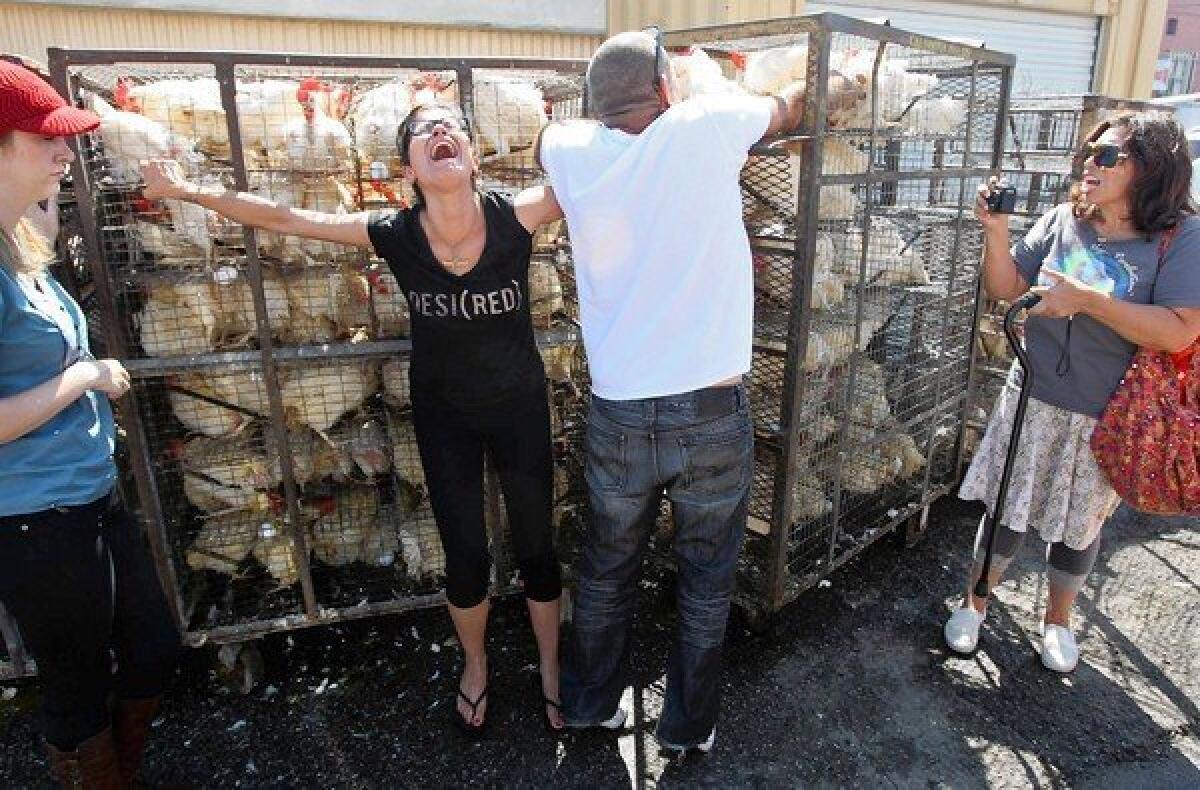2 Jewish groups get state violation notices for slaughtering chickens

- Share via
The California Department of Food and Agriculture on Friday issued notices of violation to two Orthodox Jewish groups that were slaughtering chickens in the Pico-Robertson area as part of an ancient atonement ritual.
The action was taken after animal rights activists and some faith leaders protested the practice, known as kaparot, throughout the Jewish High Holy Days, saying it was inhumane.
A state investigator determined that the facilities were slaughterhouses operating without licenses, in violation of law, said Steve Lyle, a spokesman for the state Department of Food and Agriculture.
“They should be licensed and inspected,” Lyle said.
Bait Aaron, a Sephardic Orthodox outreach organization, and Ohel Moshe, a synagogue, were performing the ritual this week in the lead-up to Yom Kippur, the Jewish Day of Atonement. Yom Kippur began Friday evening.
Bait Aaron’s operation was in a makeshift tent behind a building it rents on Pico Boulevard. Ohel Moshe’s practitioners were operating out of a temporary plywood structure in a parking lot next to the synagogue, also on Pico.
“I told them what they’re doing is against state law,” said Rhett Dunn, the investigator.
Kaparot — a relatively obscure ritual practiced by traditional Orthodox Jews, many of them immigrants — aims to provide believers an opportunity to avoid difficulties in the coming year by symbolically transferring their troubles to a chicken, killing it and then donating the meat to the needy. Promotional fliers on lampposts in Pico-Robertson advertised the service at $18 per chicken or $13 apiece for five or more.
After complaints from the public and extensive media coverage this week, officials with the L.A. County Department of Public Health and the state visited the two sites Friday morning.
In an alley behind Bait Aaron’s space on Friday, scores of hens were exposed to the sun in stacked, crowded cages, their white feathers soiled by feces and residue from broken eggs they had laid.
A practitioner recently demonstrated the ritual. He held a chicken under the wings and circled it in the air as a woman stood nearby. He recited a prayer, then slit the chicken’s neck with a scalpel-sharp blade. Butchers trained in kosher rules then dressed the chicken. Bait Aaron said it donated the chickens to charities such as the Midnight Mission.
Critics, however, said it appeared that many chickens ended up in garbage bags and trash bins.
“It appears that massive numbers of animals are being dumped,” said Rabbi Jonathan Klein, a vegan and co-founder of Faith Action for Animals, which organized the protests. Klein said Friday that he had followed a white pickup truck from one of the facilities, its bed piled with chicken-filled garbage bags, on a “high-speed chase” through the neighborhood’s residential streets.
Dunn said the practitioners cooperated with the state’s investigation. “They were very, very friendly and helpful,” he said. “I provided them with information so that if they want to do it next year, they can go through channels.”
Most meat and poultry operations are inspected by the U.S. Department of Agriculture, but small operations connected with cultural and religious practices fall under the state agency’s purview, Lyle said. He said the agency tried to be respectful of all religious and cultural practices involving ritual animal slaughter and had successfully worked with Muslim and Buddhist groups to “reach middle ground” in compliance with California laws.
Rabbi Yakov Nourollah, a spokesman for Bait Aaron, said the organizations would have been in compliance had the meat been used only for private consumption. But, since the groups were donating meat to charity, he said, the state determined they were slaughterhouses that fell under the agency’s jurisdiction. He said he would continue the tradition.
Kaparot has garnered national notoriety, with some animal rights activists calling for a ban and many rabbis encouraging the use of money in the ritual as an alternative to slaughtering chickens.
Midafternoon Friday, a handful of animal rights activists faced off with the Bait Aaron kaparot crew in the alley. Activists, a couple of them in tears, lined up in front of the cages and vowed not to move until the hens were spared.
martha.groves@latimes.commatt.stevens@latimes.com
More to Read
Sign up for Essential California
The most important California stories and recommendations in your inbox every morning.
You may occasionally receive promotional content from the Los Angeles Times.












